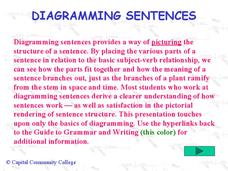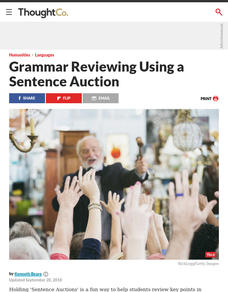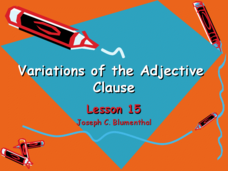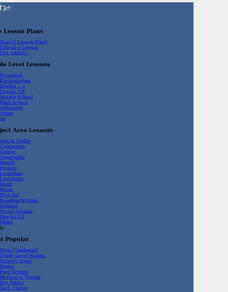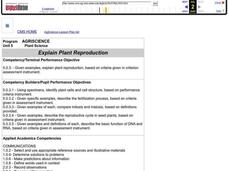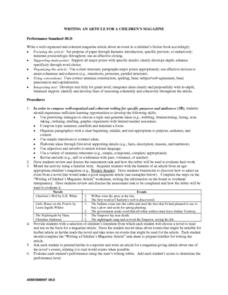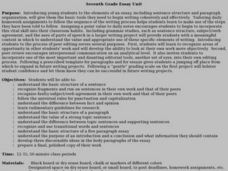Curated OER
Diagramming sentences
In an orderly fashion, go through diagramming sentences with your class. Beginning with a simple sentence and the placement of subject and verb, subsequent slides slowly add on more branches and lines with explanations of sentence types...
Curated OER
Visible Speech: What is a Sentence?
Use this straightforward presentation as a basic guide to your grammar unit. With explanations of the parts of a simple sentence (subject, verb, direct object), the slideshow is a good way to reinforce students' prior knowledge about...
Curated OER
Basic Paragraph
Explore basic paragraphs. Young writers compose a topic sentence, supporting sentences, and a concluding sentence. This activity is intended for use with a SMART Board, a software technology web link is induced.
Curated OER
Sentence Auction
Students read sentences and try to identify which ones are grammatically correct and which contain grammatical errors.
Curated OER
A Monster of a Metaphor
What do Jeep advertisements and Steinbeck's The Grapes of Wrath have in common? They both employ the art of the extended metaphor! Using the Six-Trait Writing model, learners begin to work on their own extended metaphors. Development...
Curated OER
Variations of the Adjective Clause: Lesson 15
Help your students to vary their sentence structure with this presenation, which teaches them to use relative pronouns and adjective clauses to change the order of their sentences. The presentation details different ways to write the...
Curated OER
Language with Linguistic Legos
Students visualize and manipulate sentences as building blocks, and, given a key, use Legos™ to demonstrate how to construct sentences of variety (simple, compound, complex, and compound-complex).
Curated OER
Sentence Auctions
Students proofread sentence to determine which are grammatically correct and which contain errors. They bid on grammatically correct sentences and try to buy as many possible. Points are awarded for purchased sentences that contain no...
Curated OER
School Day
Learners participate in a lesson that involves writing a persuasive essay. They use the prompt of "extending the school day". The paper should contain correct elements of sentence structure with clear purpose that is supported with...
Curated OER
The Tongue Untied: A Guide to Grammar, Punctuation, and Style
Is/are? Who/that? Young grammarians must select the correct form of the verb to agree with the subject in a series of sentences. The resource can be used for as an in-class activity or as homework for extra practice.
Curated OER
Writing in a Foreign Language
It seems that this presentation was designed for future educators, particularly those teaching a foreign language. Basic reading, writing, and organizational skills are presented, encouraging a discussion of strategies amongst your...
Curated OER
Letter Writing Basics
Learners construct a letter about a classroom issue as a class. They then write a letter individually that requests information, file a complaint or complement, or write a letter to the editor/legislator.
Curated OER
ABC Book of Tongue Twisters
Learners construct sentences using alliteration. In this phonemic awareness lesson, students listen to a read aloud such as Some Smug Slug and identify alliteration. Learners write their own sentences using alliteration.
Curated OER
Writing - Letters
The basic structure of a useful instructional activity in formal letter writing is here, but there are no procedural details or support materials to implement it. However, the idea is worth pursuing, to help your learners develop a...
Curated OER
Introductions and Conclusions
Students discuss the importance of writing clear, well structured essays. They explore the use of introductions and conclusions when writing an essay. Students compose an essay using both introductions and conclusions.
Curated OER
Beaches Trivia
For this beaches worksheet, students complete sentences about the beach and land around it. Students complete 2 pages of sentences.
Curated OER
Plant Reproduction
Students plant seeds in order to investigate and explore the questions: "How do seed companies develop varieties of plants?" and "What is the ideal plant?" Students will study related vocabulary and sketch seeds as they emerge. Students...
Curated OER
WRITING AN ARTICLE FOR A CHILDREN'S MAGAZINE
Young scholars engage in the writing of a magazine article. They focus upon the reading of a children's fiction book and create an informative narrative. They create main ideas and supporting details for the article. The supporting of...
Curated OER
Writing Through Reading
Students are introduced to a new method of writing developed by Robert Gay. In groups, they practice retelling or rewriting one of their fellow classmates stories. They are also introduced to the technique of transcribing and write in...
Curated OER
Seventh Grade Essay Unit
Seventh graders write a five paragraph essay and then branch out from there.
Curated OER
Integrating Past Continuous
Students recognize the situations in which the use of the past continuous would be beneficial in writing. They focus on the use of the past continuous as a descriptive tense when something important occurred.
Curated OER
Produce a Nonfiction Text
In this language arts instructional activity, middle schoolers look for the facts and create several nonfiction texts while including useful information for the reader.


